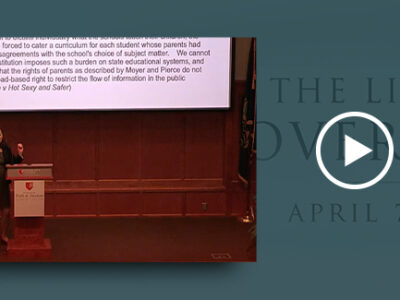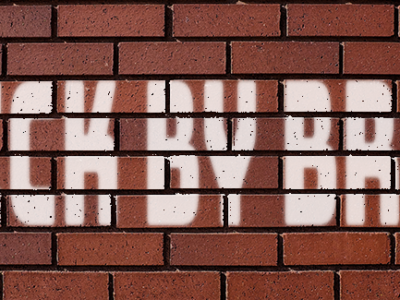Editor’s Note: The “V&V Q&A” is an e-publication from the Center for Vision & Values at Grove City College. Each issue will present an interview with an intriguing thinker or opinion-maker that we hope will prove illuminating to readers everywhere. In this third and final installment of a special three-part edition of the “V&V Q&A,” the Center for Vision & Values was granted an exclusive interview with acclaimed commentator and best-selling author Dinesh D’Souza regarding his newly released book, What’s So Great About Christianity. D’Souza spoke to the Center for Vision & Values’ Executive Director Dr. Paul Kengor.
Dr. Paul Kengor: Dinesh, what about the “antithesis” of belief in God? In your book, you address the consequences of non-religion, of atheism as a system of belief; here you point to the destruction and death wrought by atheist ideologies in the 20th century in particular. Tell us about that.
D’Souza: We keep hearing not only from the new atheists but also from political pundits that religion is responsible for most of the conflicts and violence in the world. Not true. Atheist regimes have killed more people in the past century than all the religions of the world have managed to do since the beginning of time. Let’s not even count the lesser atheist dictators like Pol Pot or Castro or Ceausescu or Hoxha or Kim Jong-Il. Focusing just on the regimes of Mao, Stalin and Hitler, we have a body count that exceeds 100 million people. Atheism, not religion, is responsible for the mass murders of history.
Kengor: But aren’t you being selective with the evidence, Dinesh? Sure, atheistic communism produced more than 100 million deaths in less than 70 years in the last century—70 million dead in China, 30 million in the Soviet Union, two million in Cambodia, two to three million in Kim’s North Korea today, to cite only a handful of communist killing fields—but Christians had the Inquisition. Are you ignoring the historical incidents that hurt your case?
D’Souza: Well, the best scholarship on the Inquisition shows that approximately 2,000 people were killed by the Spanish Inquisition over a period of 350 years. I would never apologize for the Inquisition, which I think represented a terrible strain in late-medieval Christianity. I am glad that Christianity is different now, and the closest thing you have to a religious inquisition today would be something like the regime of the ayatollahs in Iran. Still, how can you even compare the casualties of the Inquisition to those of the atheists’ regimes? Even a second-rate atheist despot like Pol Pot killed more people in a month than the Inquisition managed to do in three centuries.
Kengor: What about the Crusades?
D’Souza: The Crusades were a belated and necessary Christian enterprise to block Islamic invasion and conquest. Remember that before Islam, virtually the entire Middle East was Christian. Egypt, Syria, Palestine, Jordan—these areas were predominantly Christian. The Muslims conquered the region, and then Muslim armies invaded Europe, conquering parts of Italy and virtually all of Spain, which the Muslims ruled for nearly 700 years. The Muslims over-ran the Balkans and were at the gates of Vienna. Edward Gibbon, no friend of Christianity, says that if the Christians hadn’t fought back then, today at Oxford and Cambridge—and by extension Harvard and Duke—we’d all be studying the teachings of Muhammad in the Arabic language. Western civilization, then called Christendom, was mortally threatened. The Crusades, for all their excesses, helped to prevent this disastrous outcome.
Kengor: Curiously, this atheist-government/mass-murder thing seems to have not been a major thrust of these recent best-selling atheist books. How do those authors defend that omission?
D’Souza: Here is where atheist sophistry reaches Himalayan heights. Richard Dawkins writes that atheists might do bad things, but they don’t do them in the name of atheism. Someone should enroll the man in an introductory course in Marxism and Communism. Of course the Stalinists and the Maoists committed their crimes in the name of atheism. Ever heard of “godless communism?” The reason these regimes targeted the churches and the clergy is that they were officially and explicitly dedicated to the creation of a new man and a new society free from the shackles of traditional religion and traditional morality. Again, Hitchens is one step ahead because he knows this, but being one step ahead of Dawkins doesn’t get you very far in this race. Hitchens tries to argue that Communism was a kind of surrogate religion because it imitated religious rituals and so on. This I think is a bit much. Should religion now be blamed not only for the crimes committed in the name of God but also those committed in the name of atheism?
Kengor: Naturally, it goes without saying that you are not arguing that every atheist is a potential murderer. We know atheists who are gentler people than the Christians we know. Clarify that, if you could.
D’Souza: This is not the point at all. Consider what the atheist philosopher Daniel Dennett says in discussing religion. He says judge it by its consequences: “By their fruits ye shall know them.” Dennett says he doesn’t care if these consequences were intended by the founders of the religion or if they represent its highest and noblest values. He writes: “It is true that religious fanatics are rarely if ever inspired or guided by the deepest and best tenets in those religions. So what? Al Qaeda and Hamas terrorism is still Islam’s responsibility, and abortion clinic bombing is still Christianity’s responsibility.” Fine: I accept Dennett’s standard. But then by the same criterion, the mass murders of atheist regimes are atheism’s responsibility. If the ordinary Christian who has never burned anyone at the stake must bear some responsibility for what other self-styled Christians have done on behalf of religion, then atheists who think of themselves as the kinder, gentler type do not get to absolve themselves for the horrible suffering that their beliefs have unleashed in recent history. If Christianity has to answer for Torquemada, atheism has to answer for Stalin.
Kengor: Non-believers and even many believers ask, “Where is God?” when something bad happens. You flip this on its head by asking, “Where is atheism?” when something bad happens.
D’Souza: It’s interesting that whenever there is a real tragedy, such as the serial shooting at Virginia Tech, even the most secular campus becomes transformed, and everyone begins to use religious language and religious symbolism. Suddenly atheism disappears from the scene.
Kengor: Dinesh D’Souza, thanks for talking to us. It has been a while since you’ve been to Grove City College. Maybe we can bring you back again soon, maybe in a debate with one of these atheists?
D’Souza: It would be a pleasure.




